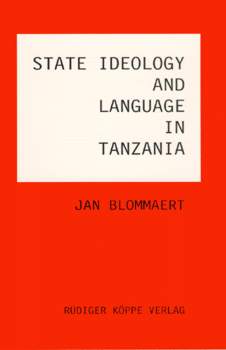
State Ideology and Language in Tanzania
Author: Jan Blommaert †. Series edited by: Bernd Heine, Wilhelm J.G. Möhlig †.
Series: EALD East African Languages and Dialects Volume 10
1999204 pp.
Text language(s): English
E-book
€ 39.80
Buy 'State Ideology and Language in Tanzania' as a downloadable PDF document directly from our online shop »
The present study analyses how Swahili – the national language of Tanzania – was politicised and incorporated in the nation-building efforts associated with the introduction of Ujamaa ideology in 1967. In particular, the book investigates the influence and effects of Ujamaa ideology on the formation, treatment, discussion, and utilisation of Swahili in the postcolonial society of Tanzania on its way to socialism.
Apart from a history of Ujamaa and the common national culture promoted by it, in which Swahili had pride of place, the study offers thorough analyses of the genesis of intellectual and scientific traditions in postcolonial Tanzania. The development of a local ‘school’ of linguistics is discussed, as well as the emergence of a heavily politicised new literature in Swahili. Central to the treatment of the issue is the role of intellectuals in the newly socialist state, their language usage in itself demonstrating many of the features of the relationship between state ideology and language.
The book is a sociolinguistic study which combines micro- and macro-sociolinguistic approaches as well as historiographic aspects of the topic. It addresses advanced students and scholars in the fields of general sociolinguistics, anthropological linguistics and Third World studies.
Reviews
Pedzisai Mashiri in Anthropological Linguistics, 43/3, 2002, 403-406
Stanislaw Pilaszewicz in Hemispheres, 16/2001, 145-146
| « back | Print version | [top] |
 Books
Books Audio
Audio Biographies
Biographies Series
Series Festschrifts
Festschrifts Journals
Journals